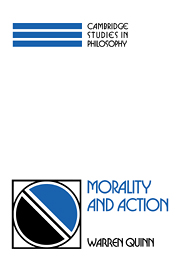Book contents
- Frontmatter
- Contents
- Acknowledgments
- Introduction
- 1 Moral and other realisms: Some initial difficulties
- 2 Abortion: Identity and loss
- 3 The right to threaten and the right to punish
- 4 Reply to Brook
- 5 Truth and explanation in ethics
- 6 Reflection and the loss of moral knowledge: Williams on objectivity
- 7 Actions, intentions, and consequences: The Doctrine of Doing and Allowing
- 8 Actions, intentions, and consequences: The Doctrine of Double Effect
- 9 Reply to Boyle's “Who is entitled to Double Effect?”
- 10 The puzzle of the self-torturer
- 11 Rationality and the human good
- 12 Putting rationality in its place
9 - Reply to Boyle's “Who is entitled to Double Effect?”
Published online by Cambridge University Press: 05 June 2012
- Frontmatter
- Contents
- Acknowledgments
- Introduction
- 1 Moral and other realisms: Some initial difficulties
- 2 Abortion: Identity and loss
- 3 The right to threaten and the right to punish
- 4 Reply to Brook
- 5 Truth and explanation in ethics
- 6 Reflection and the loss of moral knowledge: Williams on objectivity
- 7 Actions, intentions, and consequences: The Doctrine of Doing and Allowing
- 8 Actions, intentions, and consequences: The Doctrine of Double Effect
- 9 Reply to Boyle's “Who is entitled to Double Effect?”
- 10 The puzzle of the self-torturer
- 11 Rationality and the human good
- 12 Putting rationality in its place
Summary
I have only minor quibbles with Boyle's presentation of my version of the Doctrine of Double Effect (DDE). On my view, the extra morally problematic element in cases of direct intention is the subordination of a victim to purposes that he or she either rightfully rejects or (and this is something that I should now wish to add in light of Boyle's criticisms) cannot rightfully accept. In cases of indirect intention the victim is incidentally affected by an agent's strategy, but in cases of direct intention the victim is made part of the strategy. Boyle suggests at one point that this amounts to using the person. But I do not think the “using” metaphor is always apt in these cases, although it is perhaps helpful in pointing to the objectionable element in direct intention, which in its perfectly general form can be put only more abstractly.
My only other concern with Boyle's exposition of my view involves his use of the expression “intentionally harming.” The discussion there tends to suggest, in contrast to what Boyle has said earlier, that I represent DDE as discriminating between cases of incidental and intentional harming. But this is precisely what I tried to avoid. For some cases of harming that the doctrine intuitively speaks against are arguably not cases of intentional harming, precisely because neither the harm itself (nor anything itself causally very close to it) is intended.
- Type
- Chapter
- Information
- Morality and Action , pp. 194 - 197Publisher: Cambridge University PressPrint publication year: 1994
- 1
- Cited by



